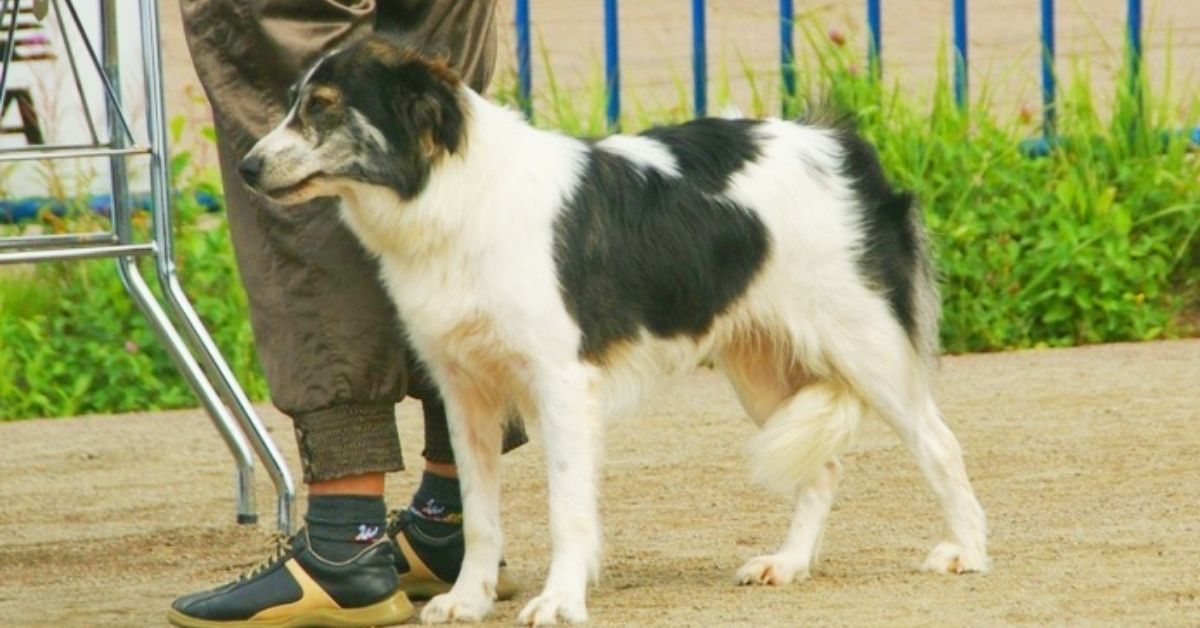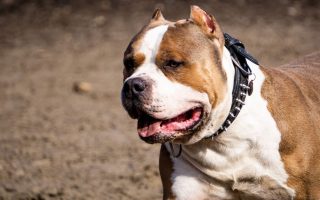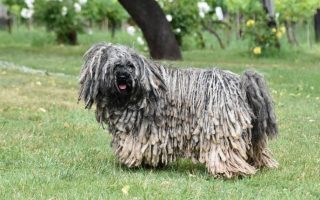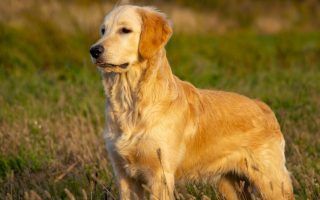From being a guard dog to becoming a member of a family, Aidi dog breed fans and lovers can testify to the numerous benefits of owning them.
Their lovely appearance, temperament, and foreign origin appeal to many pet owners.
If you’re here, chances are you want to own a pet, and we know how big a decision that can be, or you’re just interested in learning about the breed.
There are so many factors to consider it becomes discouraging sometimes. You need a dog that can fit into your living environment, family, lifestyle, and level of activity. Though it can be tough, information makes the search easier.
Here, you will get to know all about the Aidi dog breed information and facts, satisfy your thirst for knowledge, and know whether or not the North African breed is right for you.
Aidi Dog Breed Information & Key Facts
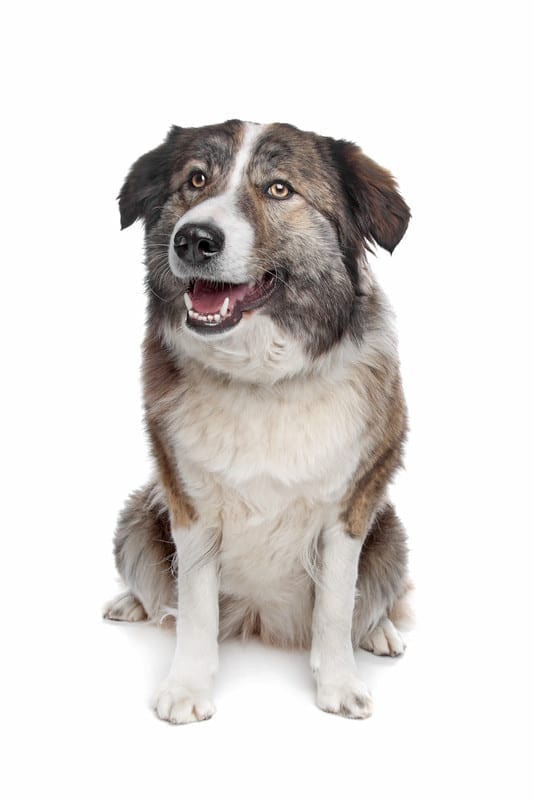
| Dog Breed Group | Guardian Dog |
| Breed Type | Purebred |
| Height | 20 to 24 inches |
| Weight | 50 to 55 pounds |
| Coat | Thick |
| Color(s) | Black, brown, brindle, cream, red |
| Life Expectancy | 10–12 years |
| Temperament | Agile, alert, sensitive, energetic, powerful, protective |
| Origin | Morrocco |
| Bred For | Guarding livestock |
| Nickname(s) | Atlas Mountain Dog, Atlas Shepherd Dog, Berber Dog, Chien de l’Atlas, Chien de Montagne de l’Atlas, Kabyle Dog |
| Recognized by the AKC | No |
| Recognized by the UKC | Yes |
Aidi Characteristics
| Characteristics | Rating |
|---|---|
| Adaptability | 3/5 |
| Friendliness | 2/5 |
| Kid-Friendly | 4/5 |
| Pet-Friendly | 3/5 |
| General Health | 4/5 |
| Grooming Needs | 2/5 |
| Trainability | 3/5 |
| Intelligence | 4/5 |
| Playfulness | 4/5 |
| Exercise Needs | 3/5 |
| Energy Level | 4/5 |
| Tendency to Bark | 2/5 |
| Tendency to Drool | 3/5 |
| Tendency to Snore | 1/5 |
| Tendency to Dig | 2/5 |
Little-Known facts about the Aidi Dog Breed
Fact #1: They are excellent watchdogs
Keeping watch is a skill Aidis picked up from their days guarding livestock. They were quick to detect danger and alert the flock.
Now, you and your property are the ‘livestock’ they want to protect. So if they detect a stranger or something unfamiliar, they will alert you of it. Nothing goes past them.
Fact #2: Their thick coat is different from other African dogs
Generally, African dogs come with short coats due to the sunny climate that’s dominant in the continent.
However, Aidis has a thick, double coat that can withstand the freezing winter. The coat helped them keep warm in mountainous areas.
Another benefit of the thick coat is protection. In their herding days, Aidis came in contact with numerous predators who are eager to sink their teeth anywhere. The coat lessens the impact of such bites.
Fact #3: They withdraw from strangers
Here’s another trait that makes them good guardians. However, it is not okay if you’re looking for a very friendly pet.
Aidis tend to be suspicious of strangers and will not warm up easily to a new face. Don’t expect them to entertain strangers and discourage visitors from touching them.
They can get aggressive when they view a stranger as a threat.
Fact #4: They are sensitive
Aidi’s sense of independence and dominant streak lie side by side with a sensitive nature.
They withdraw and turn antagonistic at harsh corrections, even ones meant to train them. Punishments are a definite no unless you want to damage your dog’s psyche.
A better way to get them to obey is with calm, firm instructions laced with reinforcements and rewards.
Fact #5: They don’t do well indoors
Aidis are outdoorsy and can’t suit apartment living. They’re often gotten by rural dwellers and they require enough space to move comfortably in.
The Aidi is not for you if you live in a cramped flat in a bustling city.
If you keep them indoors, your energetic dog who wants to run around would cause havoc for you to come back to. It’s not worth the risk.
Breed History & Origin
Aidi dog breeds have their roots in the Atlas mountains of Northern Africa, specifically from Morrocco. They are also popular in other North African countries like Algeria.
There has been no general consensus concerning their date of origin but experts have brought forth various theories.
One such theory is that Aidi is a thousand years old. Another suggests that they existed during the times of the Phoenicians.
Both theories can’t be currently accepted as facts because they haven’t been verified. They remain speculations.
Furthermore, a misconception about Aidis from their historical background is that they are herders, like the German Shepherd. In fact, they were once named the Atlas Sheepdog.
Aidis are actually guardians, not herders. They stand watch and raise a warning when they sight danger.
In the course of their work, their owners often teamed them up with a much more regarded dog breed, the Sloughi. While Aidis stay on the defensive, Sloughis go on the offensive.
Compared to other Morrocoan breeds, Aidis used to get less respect as others were considered nobler. However, this has changed in recent years as more indigenes appreciate Aidis for their different services.
Their versatility is admirable. Aidis guard humans and their property, make good companions, work as a police dog, and have hunted too.
Such good achievements pushed Moroccans to establish a club with Aidi’s best interest at heart.
Aidi Temperament & Intelligence
Aidi dogs are energetic, protective, strong, and guardians ready to defend. They are equally tender and loyal towards everyone in the family, adults and kids alike.
They are cautious with strangers, though, and may not be warm in receiving visitors. Their affection doesn’t go that far.
Try not to get strangers too close without proper socialization or they may perceive the person as a threat and react accordingly. As you train them, they become less suspicious of visitors.
Aidi dogs are independent thinkers with a keen sense of smell and love for activities. Ensure you keep them busy so they won’t get bored and engage in destructive activities.
They are comfortable with kids they know, though you should supervise any interaction your kid has with a canine.
Owners find them easy to take care of as they have no high grooming demands. As a pet parent, you’d find a degree of safety, love, and protection from our African guardians.
For this breed, training and obedience is a challenge. New dog owners are not advised to get an Aidi dog as they are stubborn, dominant, and need a confident leader to make them know their place.
Teaching them is achievable, however, with experience, motivation, and strict standards they must adhere to.
With enough positive reinforcements, rewards, socialization, and activities to keep their physical and mental selves intact, Aidis thrive. If you can take up the challenge of training a dog without having to resort to harsh methods to get them to comply, have a shot at the Aidi.
Finally, with proper social training, they can live with other pets.
Is an Aidi dog a good family dog?
Aidis integrate well into families and remain loyal to those they love. While wary of strangers, they are open to the care and attention of family members.
They are also ready to fight, if necessary, in defense of their family. You will enjoy having an Aidi if you want a watchdog and guardian who is also a good companion.
You should consider some factors, though. Your level of experience, lifestyle and personality matters. New owners may have difficulties with the Aidi.
Those living in apartments may not be able to handle one too. Also, if you want a social, people-friendly dog who’d receive and entertain visitors, the Aidi doesn’t do that.
Are Aidi dogs good with kids?
Aidis are kid-friendly dogs who pose no significant danger to your child. Their loyalty, affection, and protectiveness extend to your little feet family members.
Of course, one can not be too comfortable leaving a dog with a child unsupervised. Ensure you are present when your child plays with a dog and keep watch.
Having said that, you don’t have to worry about owning an Aidi if you have small children. They can handle kids.
Are Aidis good with other dogs and pets?
Due to their wariness and instinctive hostility when faced with perceived danger, you have to train them properly if you want them to coexist in peace with other animals.
As puppies, they may have problems with any other dog who gets in their space. That territorial nature doesn’t quite leave as they mature.
However, with socialization, they can learn to accommodate other pets.
Male vs Female Aidi Dog Breed
The male and female of any breed come with a set of strengths and weaknesses. Some owners prefer certain genders. If you want to get your dog neutered, then gender should not be an issue for you.
However, if you prefer an unneutered pet, you may want to get information on the gender differences to make your choice easier.
The weight and height of a male and female Aidi dog are similar. They both weigh 50 to 55 pounds with a height of 20 to 24 inches.
The genitals are the main difference. In general, the male genitals of any dog breed is visible and stick out, unlike the female.
In addition, the male Aidi has more fur than the female which makes him appear bigger in size. They are also more territorial, playful, and broader.
Caring for an Aidi
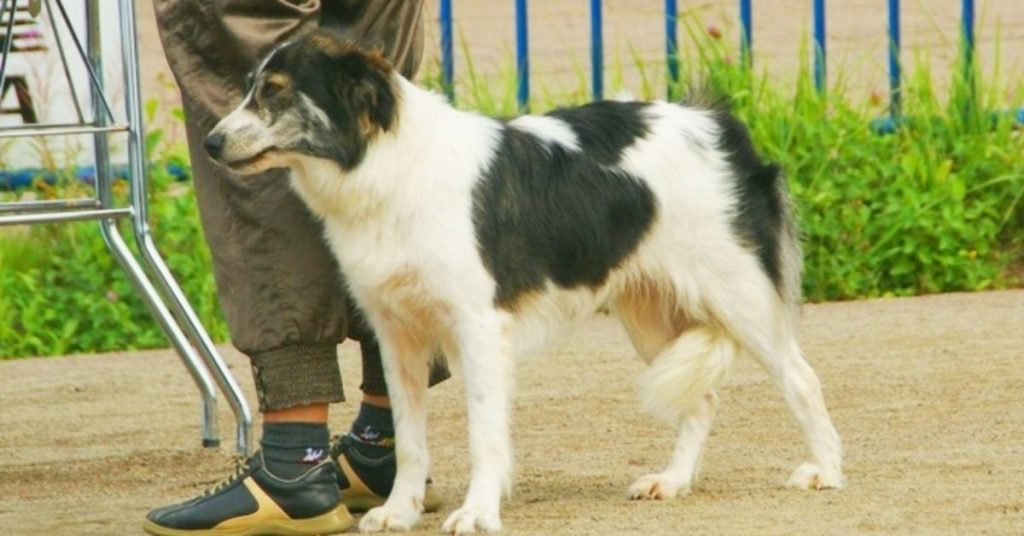
The Aidi is an outdoor pet and can’t be an apartment dog. They are not advisable for city dwellers, but okay for those with a yard or those who live in the countryside.
They need space to move around as they are energetic. They also require exercise or they may seek other less constructive ways to be busy.
It is best to keep them in an open area where they can freely use up their energy.
Training this breed is achievable, but it isn’t a walk in the park. Their dominant streak and independent spirit can pose a challenge that you should overcome with firmness and gentleness.
They equally have a low grooming need and stay healthy when well taken care of.
Aidi Dog Food and Diet
What you feed your dog is essential to growth, overall health, and fitness. A poor meal puts your dog at risk.
You have to get the right diet and proportion to avoid them either being underweight or overweight. Both situations come with consequences.
Aidis require a diet filled with beneficial nutrients. You can’t afford to be negligent and scoop any food into his bowl. Their medium size and energy should be put into account when giving them their meals for the day.
This breed can be satisfied with quality dry food in about 1½ and 2½ cups, fed twice a day.
Overfeeding Aidis can make them pile on unhealthy pounds, a situation you should rather avoid as obese Aidis suffer from breathing, digestive, and muscle complications. If your dog is overweight, feed them less and exercise more.
Certain nutrients are good for your Aidi and should be included on a regular basis in their meal. They come highly recommended. Some of these nutrients are:
- Protein
- Fruits
- Olive oil
- Minerals
- Vitamins
- Vegetables
In contrast, avoid feeding them:
- Alcohol
- Chocolates
- Onions
- Garlic
- Chicken
Puppies and adult dogs do not have the same meal requirements, just like human adults don’t eat meals meant for babies. The way you’d feed a puppy should differ from an adult dog.
The Aidi puppy eats more. At 8 to 12 weeks, they need about 4 meals in a day. It goes down to three once they get to four months, and on it reduces as they grow older.
The old Aidi requires lesser than both puppies and young adults. Their meal should be of a smaller quantity.
Aidi Exercise
Regular exercise is necessary for your dog irrespective of personality, size, and appearance. As humans exercise to keep fit, be healthy, and look good, canines need to work out their bodies.
Aidis are highly energetic and need to burn it out. They love being active and are not used to sitting idle. A moderate to a high level of exercise suits them.
If you are not used to an active lifestyle, the Atlas Mountain Dog may not be for you. The physical exercise consists of walks, jogs, or letting your Aidi run around a fenced yard without a leash. A game of fetch does wonders, too. Aidis also like to swim and hike.
Also Read: How to Prepare your Dog for Hiking
In addition to physical activities, add some mental challenges to keep their busy mind working.
Puppies need a different exercise regime. They should not be allowed to participate in activities like jumping and running until they are a bit older. To exercise an Aidi puppy, a simple walk will suffice.
Older dogs don’t need as much exercise as younger ones, but you still have to keep them fit. This helps them control weight and avoid joint pains.
The Aidi dog can be your best friend when he/she is trained. However, when they lack training, they can become dangerous to everyone.
While you need confidence and strictness to teach your dog good manners, harsh treatments and punishments are not necessary and will do more harm than good.
So, you should know how to distinguish training from abuse. Do not mix both.
Socialization is a must for any dog, especially ones like Aidis. Take them to different places and unwrap the world. Let them meet new people, get accustomed to unfamiliar sights, smell unknown scents and be friendly.
Without socialization, Aidi will remain hostile towards strangers and other animals.
Aidis are independent, dominant, intelligent, and strong, so they need an alpha leader to lead them.
They are also sensitive and would not trust you if you are harsh on them. Be gentle but firm, using positive methods of training to gain enough results. They also get bored quickly, which is where diverse activities come in.
Start them off as puppies with simple commands like:
- Sit
- Heel
- Stay
- Down
A new pet parent will find training Aidi difficult. They are a good pet choice only for the experienced.
Aidi Dog Grooming Needs
Aidis shed at a moderate level and do not have high grooming needs. This is good if you don’t have the time to spend on grooming. You equally don’t need to hire a groomer, which saves cost.
Brush them twice a week with a pin brush to break knots and reduce excesses. During seasons when they get to their shedding peak, brushing should be done once daily. Bathing shouldn’t be too frequent as it may reduce the oil the Aidis need.
You may wish to get olive oil to help maintain their oil level. If you’re wondering about dirt if you’re not to bathe them regularly, don’t worry. Their coat type prevents them from getting easily dirty.
Their teeth and nails shouldn’t be neglected too. Make sure you brush those teeth at least twice a week and trim their nails before they get too long.
Aidi Health Conditions
An unfortunate reality is that dogs, cats, and other animals fall sick. As much as we do our part to prevent certain health conditions in our furry friends, we cannot totally avoid them.
When you get a pet, it is important you ensure the health factor is in place and keep in mind possible medical conditions.
Aidis have a relatively long life span when all needs are met and have no medical conditions associated with them. However, they may suffer from illnesses like:
Hip dysplasia
This is an inherited condition that goes straight to the hips, causing pains and can lead to lameness. When getting an Aidi dog, be sure your breed did not inherit this defect.
Elbow dysplasia
A dog gets elbow dysplasia when the joint doesn’t grow the way it is supposed to. It causes pain coupled with stiffness and can lead to arthritis.
Frequently Asked Questions
Is an Aidi dog right for you?
Aidis have a lot of family-friendly qualities. They are loyal, protective, affectionate, and playful with kids. They make good companions and watchdogs. When well trained, they are a delight to have.
This doesn’t mean they are for everyone. Consider your lifestyle and environment before choosing this breed. They are not indoor pets, neither are they willing to entertain strangers. They equally need an experienced, strong owner.
If you can cope, then the Aidi is right for you. If not, go for another dog breed.
What are Aidi dog breeds known for?
In Northern Africa, Aidis were bred as guardians of the flock. That’s why they make good watchdogs today. However, they are not herders. They only guard and are alert when they perceive possible danger.
Aidis are well known in the area they came from but are rare in other continents.
How big is a full-grown Aidi?
An adult Aidi weighs about 50 to 55 pounds with a height of 20 to 24 inches. The male and female weigh the same
Do Aidi like to cuddle?
While they are playful and loving, Aidis are primarily guardians and workaholics. They’d rather be outside working, playing, or standing guard than staying on the couch with you, cuddling.
Is it hard to take care of Aidi dog?
The Aidi doesn’t require much grooming. They are low maintenance and it doesn’t take much to keep them clean. You do need to meet their need for exercise, however. Overall, they are easy to take care of.
How Long do Aidi dogs live?
Aidis are healthy animals who would remain with you for a while. Though they can fall ill, they are not always vulnerable to illnesses. They have a life span of 10 to 12 years.
How Much does an Aidi dog cost?
Aidis are rare outside Morrocco and Northern Africa. Getting one is not easy, so you have to spend. Aidi puppy prices range from $450 to $1,100. A full-grown dog is around that same price. Ensure you find a responsible breeder.
Do Aidi dogs shed?
Aidis shed moderately and have particular seasons when shedding gets to its peak. Endeavor to keep them well-groomed during these periods.
To Wrap Up
Aidi comes with many wonderful traits. They have their challenges as well, so they are not suitable for everyone. You should do your homework before getting one.
This article on Aidi Dog Breed Information & Facts is a good starting line. With it, it shouldn’t be difficult for you to decide whether or not the Aidi is right for you.
Like any other breed and animal, they deserve your love and commitment to training them into dogs that fit into society. You equally should meet their individual needs for exercise, space, and adequate training.
Related: Complete Alphabetical List of Dog Breeds
Helpful Resources
- Official Profile: Atlas Mountain Dog (UKC)
- Breed Standard: Official UKC Breed Standard
- Explore Other Breeds:

